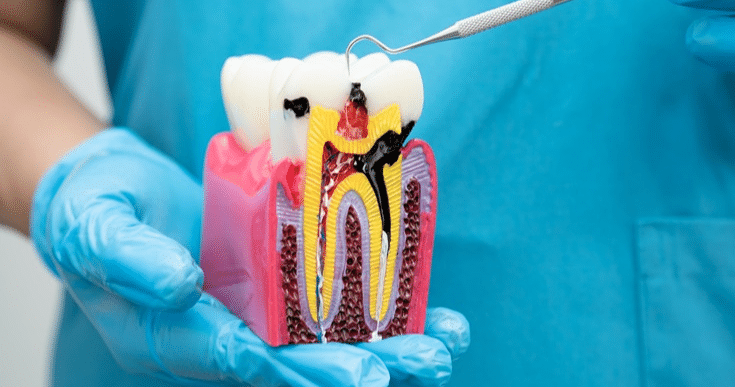
What Is a Root Canal?
A root canal is a dental procedure aimed at rescuing severely damaged or infected teeth. During this treatment, the infected pulp within the tooth is meticulously removed, followed by thorough cleaning and sealing of the root canal. The objective is to salvage the tooth’s structure and functionality, thereby avoiding extraction.
10 Signs You May Need a Root Canal
Persistent Toothache
A continuous and severe toothache, especially while eating or applying pressure, can indicate an infection or inflammation deep within the tooth’s pulp. The discomfort might be caused by nerve damage, necessitating a root canal to alleviate the pain and address the underlying issue.
Sensitivity to Hot and Cold
Heightened sensitivity to hot or cold temperatures, even after the stimulus is removed, may signal an infection that has reached the nerves within the tooth. This sensitivity often lingers and can be particularly bothersome while consuming hot or cold foods and beverages.
Swollen Gums
Inflammation and tenderness in the gums surrounding a specific tooth can be a clear indication of infection. The infection might have spread from the tooth’s pulp to the surrounding tissues, requiring a root canal treatment to eliminate the source of the problem.
Darkening or Discoloration
Noticeable darkening or discoloration of a tooth might indicate that the internal pulp has been affected by decay or infection. This change in color can result from the breakdown of internal tissues and blood vessels, warranting a root canal to save the tooth.
Pimple on the Gums
The appearance of a pimple-like bump, often filled with pus, on the gums near a specific tooth can be a sign of a dental abscess. An abscess is a pocket of infection that requires immediate attention, usually involving a root canal to eliminate the infection and save the tooth.
Prolonged Pain after Dental Procedures
If you experience lingering pain after dental work, such as fillings or restorations, it could indicate that the inner pulp of the tooth has been affected. This may necessitate a root canal to address any infection that has developed.
Tender Lymph Nodes
Swelling and tenderness of lymph nodes in the neck or jaw could be a response to an ongoing dental infection. Lymph nodes act as filters for infection-fighting cells, and their enlargement can signify an underlying issue that might require a root canal.
Gum Boil
A gum boil, also known as a gum abscess, is a painful swelling filled with pus that develops on the gum near an infected tooth. This is a clear indication of infection, and a root canal is often needed to remove the infected pulp and prevent further complications.
Cracked or Chipped Tooth
A tooth that is cracked or chipped exposes the inner layers of the tooth to potential infection. Bacteria can easily infiltrate the damaged area, leading to inflammation and infection within the pulp. A root canal might be necessary to address this issue and save the tooth.
Pain Spreading to Nearby Areas
Pain radiating to the jaw, ear, or adjacent teeth can signal that an infection originating from a particular tooth has begun to spread. This suggests that the infection has reached a more advanced stage, and a root canal may be required to eliminate it and prevent further complications.
How to Prevent Needing a Root Canal?
Preventing the need for a root canal involves consistent dental care and mindful choices:
- Maintain Good Oral Hygiene: Brush and floss regularly to prevent decay and gum disease.
- Attend Regular Dental Check-ups: Regular visits to a qualified dentist in Pharr ensure early detection and intervention.
- Address Dental Issues Promptly: Treat cavities and fractures promptly to prevent them from worsening.
- Wear a Mouthguard: Protect your teeth during sports or teeth grinding to avoid damage.
- Adopt a Healthy Diet: Reduce sugary foods and drinks that contribute to decay.
- Avoid Bad Habits: Refrain from chewing on hard objects that can lead to dental damage.
- Use Fluoride Toothpaste: Strengthen your tooth enamel and minimize the risk of cavities.
Recognizing the signs that indicate a potential need for a root canal is a vital aspect of proactive dental care. For individuals seeking a reliable dentist in Pharr, prompt identification and intervention can help preserve your natural teeth and maintain your oral health. By being attuned to your dental well-being, practicing good oral hygiene, and seeking timely dental guidance, you can take steps towards a healthier and more confident smile.




